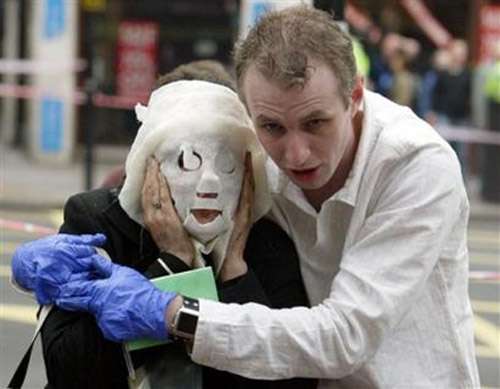The London 7/7 Terrorist Attack Watch: Britain Missed Chances at Foiling Bombings

ASSociated Press: Britain Missed Chances at Foiling Bombings
Britain’s intelligence agencies missed chances to thwart last year’s transit attacks by failing to follow up leads on two of the men who became the country’s first suicide bombers, major reports said Thursday.
The government blamed a lack of funds, a too-slow buildup of intelligence staff in the wake of the Sept. 11 attacks on the United States, and spies’ failure to anticipate that British citizens would contemplate suicide attacks on their homeland.
But the reports found “no culpable failures” by agencies, including the MI5 and MI6 intelligence services, saying the bombings of three London subways and a double-decker bus July 7 came without warning.
Britain’s Home Office said in one of the reports that there is “as yet no firm evidence” of al-Qaida’s role, if any, in organizing the attacks, which killed 52 commuters and the four bombers.
However, suspected ringleader Mohammed Sidique Khan and accomplice Shezad Tanweer traveled to Pakistan and it is “likely that they had some contact with al-Qaida figures,” said a second report, by the Intelligence and Security Committee, a panel of nine British lawmakers.
Perhaps if Britain would have had a telecommunications surveillance program in place the July 7th bombings would have been prevented.
Intelligence agencies also knew Khan had planned meetings with a terrorist suspect in 2003, the report said. It reported for the first time that phone numbers for Khan and a third bomber, Jermaine Lindsay, 19, a Jamaican-born Briton, were also stored in intelligence records.
If these terrorists’ calls had been intercepted or telephone numbers crossed referenced?
But, maybe Britain is intercepting calls now. And why they have prevented subsequent terrorist attacks.

Paul Dadge, right, helps injured tube passenger Davinia Turrell away from Edgware Road tube station in London following an explosion, Thursday July 7, 2005. A series of deadly explosions in London on July 7, claimed at least 52 lives and injured hundreds of others. The dressing is coated with a special jel which is designed to prevent infection and reduce skin temperature from the burn. The decision by British intelligence agencies not to concentrate on two London bombers and to focus their attention on other individuals considered more dangerous before the July 7 attacks was understandable given the scale of the threat and limited resources, a legislative committee reported Thursday May 11, 2006.
RELATED